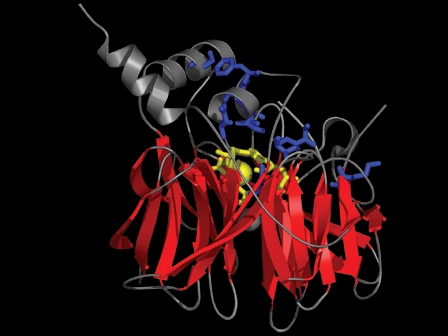Proteins. They’re the stuff of our muscles, nerves and organs. They’re the enzymes that control our body’s functions, the basic parts of the molecular machinery that keeps our cells alive, the molecules that transfer signals into cells and initiate gene copying so that more proteins can be made. Each of the hundreds of thousands of different proteins in our bodies is produced as a long chain of amino acids that folds up into a unique shape.
Some of these – those that maintain our body’s structure, for instance – keep this shape throughout; but others shift, bend and stretch as they work. Uncovering the complex interplay between form and function, between one protein and another, between genes and the proteins they encode, is not only important for learning how the body works; it’s crucial for understanding many types of disease, as well as the body’s response to disease-causing pathogens.
Institute scientists employ a wide variety of approaches to researching proteins – from solving the structure of crystallized proteins to creating computer simulations of protein dynamics.
In the Faculty of Biochemistry, Prof. Gideon Schreiber examines interactions between proteins. His studies of interferon – a part of the body’s response to viral pathogens – are revealing how a single protein can transmit different signals depending on how it binds to cell wall receptors, and this information may lead to improved interferon-based drugs. Prof. Dan Tawfik investigates how proteins evolve. His methods for directing their evolution in the lab enable him to trace the evolution of new structures and functions, and to generate proteins with therapeutic potential. Prof. Rivka Dikstein looks at the mechanisms that control the types and amounts of proteins produced in each cell. She recently discovered a mechanism, shared by 5% of the genes, that coordinates the two major stages of protein production: gene transcription and its translation into protein.
Prof. Rivka Dikstein’s research is supported by the Yeda-Sela Center for Basic Research; and the Pearl Welinsky Merlo Foundation. Prof. Dikstein is the incumbent of the Ruth and Leonard Simon Chair of Cancer Research.
Prof. Gideon Schreiber’s research is supported by the Clore Center for Biological Physics; and the Helen and Milton A. Kimmelman Center for Biomolecular Structure and Assembly.
Prof. Dan Tawfik’s research is supported by the J&R Center for Scientific Research; the Willner Family Leadership Institute for the Weizmann Institute of Science; the Wolgin Prize for Scientific Excellence; the Sassoon and Marjorie Peress Philanthropic Fund; Miel de Botton Aynsley, UK; Samy Cohn, Brazil; Mario Fleck, Brazil; Yossie Hollander, Israel; David Rosenberg, Houston, TX; Charles Rothschild, Brazil; and Roberto and Renata Ruhman, Brazil. Prof. Tawfik is the incumbent of the Nella and Leon Benoziyo Professorial Chair.

